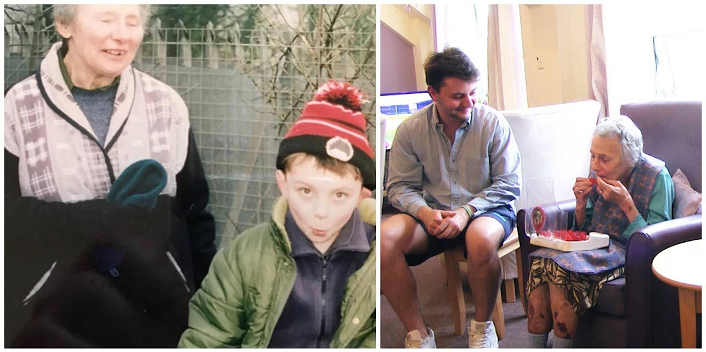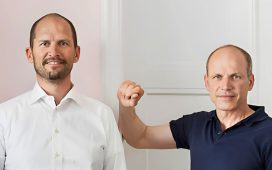I was studying engineering at the University of Bristol when my Grandma Pat, who had dementia, was rushed to hospital. She had become severely dehydrated, and my family was told to expect the worst.
Thankfully, after 24 hours on IV fluids, she made a full recovery, but I was shocked that not drinking enough had such a huge impact on her health. Looking into it further, I realised that the situation isn’t uncommon. I wanted to help.
I’ve always been driven by innovation. After leaving Bristol, I won a scholarship to study at Imperial College London and The Royal College of Art.
Here, I was able to apply creativity and technical understanding to tackle meaningful issues. But I soon realised that, in order to have real impact, these concepts need to get out into the world. That’s when I had the business idea that would help my Grandma and over 60,000 dementia patients.
“I made the prototype in my student kitchen”
Many in the later stages of dementia forget to drink. They may refuse help, or lack the dexterity to help themselves, which can affect their nutrition. While my grandma was ill, I spent a month living in her care home, speaking to and observing residents, as well as their family members and carers.
I noticed that, while it was almost impossible for many to hydrate independently, almost everyone was happy to eat a treat. I would be ignored by residents (which is fair enough!) but if I had a box of sweets then everyone wanted to be my friend and enthusiastically took a handful.
From this, Jelly Drops was born. Jelly Drops are tasty, fruity sweets that are sugar-free. Crucially, they’re also 95% water-based, and come with added electrolytes and vitamins for easier hydration.
When I first showed the prototype to Granny she ate seven drops in 10 minutes. After posting a video of her eating them online it quickly went viral, accumulating 100m+ views. From this trick of digital marketing, I was inundated with global requests; all while still making them in my student kitchen.

Lewis and his late Grandma Pat, who inspired Jelly Drops
Jelly Drops suddenly had a community of tens of thousands, and the potential to help millions – but I knew I wouldn’t be able to realise this alone. I joined forces with Claudia Arnold, Jelly Drops co-founder and COO. Together, we set about taking Jelly Drops from concept to reality.
“Everyone from the team helped out”
It took 18 months to develop an ambient stable 95% water sweet that was easy to pick up and chew. Then, we had to figure out how to make it at scale.
Nobody knew how to do this so we set up our own production facility and designed the process ourselves. We ended up packing the first 10 million drops in a small unit in Hackney.
Having control over manufacturing allowed us to be super agile in responding to customer feedback. At some point or another, everyone from the team has found themselves helping out in the factory.
This proximity to the product also meant we stayed innovative and responsive. The insights we gained also allowed us to automate, and this has given us the scalability required to reach our objectives.
“Encouraging joyful moments”
Currently, over one million Jelly Drops are eaten a month across the UK, US and Canada – but our ambitions are much bigger. Dementia, and other conditions impacting hydration, are global issues and we intend to scale to meet the size of the problem.
We have a growing customer base outside of dementia; many of whom struggle with hydration for a variety of reasons such as those with Autism Spectrum Disorder (ASD), learning difficulties, or who are undergoing chemotherapy.
We want to get the product to those that need it the most. Often these are people in hospitals, so we’ve been working with a number of NHS Trusts to make Jelly Drops available on the ward to speed up recovery and get people home quicker.
Another huge early achievement has been partnering with the Alzheimer’s society through their innovation accelerator programme. We now donate 1% of all our profits to them.
Ultimately, we want to build a more caring and inclusive world for those living with dementia, as well as others underserved by conventional products. Through supporting essential nutrition, and encouraging joyful moments, we want to bring a smile to millions just like Grandma Pat.











